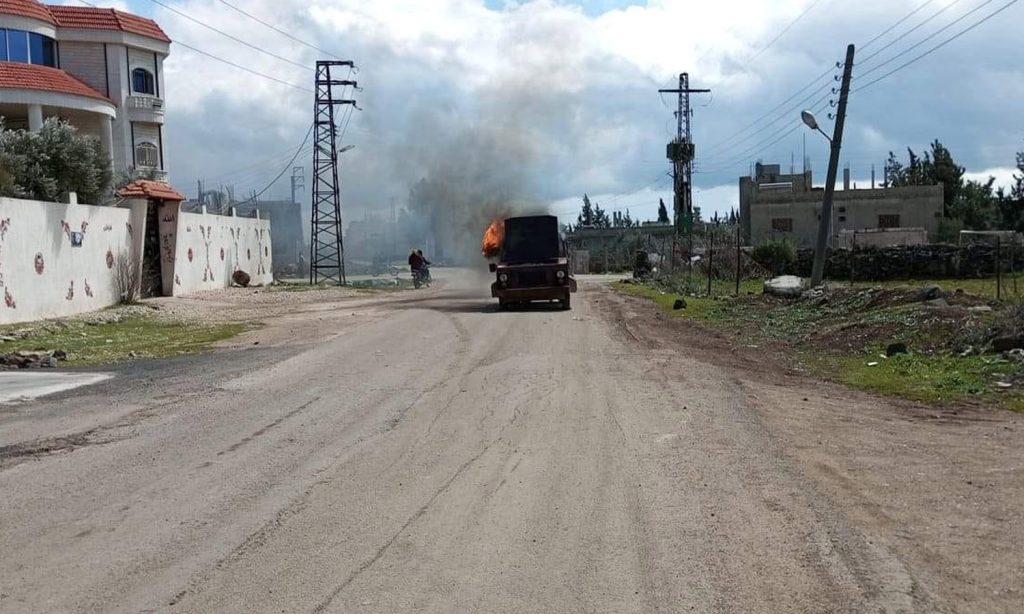Multiple fighting has occurred in the southern regions of Daraa over the past years, internal conflicts between factions and local armed groups with multiple affiliations, which took place inside residential areas and between civilian homes and resulted in losses in their lives and property.
The latest fighting took place in the town of Inkhil, north of Daraa, on March 26 and led to confrontations between a group of fighters operating under the banner of the Eighth Brigade and tribesmen from the same town, which left one man dead and another wounded.
It was preceded by similar confrontations in the east of the governorate as well, on March 6, which resulted in injuries among the residents of the town of Umm al-Mayathen and the burning of some houses belonging to civilians.
Escape is a solution
Anas was displaced with his family from Inkhil following the clashes on March 27, after it was reported that a civilian was killed inside his house by random bullets flying between civilian homes.
Anas told Enab Baladi that a number of residents were displaced on the first day of the confrontations. Schools in the town were closed, and life stopped completely for three days in a row, while some residents remained stuck in the area as the fighting intensified.
Other cases reported to Enab Baladi by civilians from the towns of Saida and Umm al-Mayathen, east of Daraa governorate, are similar to the case of Anas, as they lived through the same details with the outbreak of confrontations between a group affiliated with the Military Security and the Eighth Brigade, which has the strongest influence in the region.
The clashes, which lasted for three days, resulted in the death of a civilian and the wounding of others, in addition to the burning of a civilian house and material damage to other homes.
The chaos resulting from the confrontations prompted the notables of Umm al-Mayathen to issue a statement calling on the factions to settle their scores outside the town, threatening an “armed” response in case the area is turned into a battlefield again, terrorizing its residents.
Evidence of failure
Researcher Ahmad Abazeid told Enab Baladi that the current situation in southern Syria is “the biggest evidence” of the failure of the theory of achieving stability promoted by the regime regarding its control of the region.
With the passage of more than four years since the “security settlement,” the regime has not achieved stability in the south and has not been able to actually conclude a reconciliation with the local community.
The researcher, originally from Daraa, added that the failure of the steps to achieve stability became evident after the recent US and British sanctions against some of the leaders of these militias, including those who belong to the security branches of the regime in Daraa.
Abazeid believes that the model of the south confirms that the regime cannot act as a state in the social environments that have turned against it, nor can it achieve true reconciliation with societies that reject it, and it may not want to achieve stability and provide guarantees for refugees from these areas until they return to it.
Parties reinforced chaos
One of the notables of Daraa governorate, who preferred to remain anonymous for security reasons, told Enab Baladi that the instability in the entire Hauran region still affects public life directly, both in terms of social and economic aspects.
He added that multiple parties are working to destabilize the region, including the regime that does not stop threatening to storm some areas and carry out raids there, as happened in the areas of Daraa al-Balad in 2021 or the cities of Tafas and Jassim in mid-2022.
The Islamic State (IS) group also plays a role in the state of instability, according to the source, as its cells are entrenched in some areas outside the regime’s effective control, which makes them (the areas) vulnerable to turning into a battlefield at any time.
As happened in Tariq al-Sad neighborhood in Daraa al-Balad at the end of 2022, when battles broke out between groups accused of affiliation with the IS and local ones supported by the Eighth Brigade, he said.
Battles that affected public and private property took place after confrontations in October 2022, which lasted for 15 days in Jassim city against IS cells, followed by confrontations, in November of the same year, in Daraa al-Balad, as the Tariq al-Sad neighborhood witnessed battles between local factions and IS-linked groups.
In addition, there are conflicts caused by the factions that have joined the ranks of the regime, such as the Eighth Brigade, which has become affiliated directly with the Military Security, the al-Kasm group, and the Abu Ali al-Lahham group.
Panic state continues
Political affairs researcher Yasser Masalmeh told Enab Baladi that these battles have affected society by perpetuating the constant “state of terror” among the population because everyone has become targeted in one way or another.
The France-based scholar, who hails from Daraa governorate, added that the state of frequent mutual targeting between opposition groups and the Syrian regime, in addition to targeting and kidnapping operations for the purpose of theft, made the society insecure as a whole, which was reflected in the economic activity in the governorate.
The southern region did not witness an actual reconstruction movement due to these tensions, despite the passage of five years since the regime took control of Daraa, in addition to the security restrictions imposed by the regime on the population and the imposition of royalties, arrests, and other things.
These repeated incidents prompted some residents to restrict their movement and refrain from working, as external remittances have become a “lifeline” and the only means for civilians to continue living, Masalmeh concluded.
Enab Baladi’s correspondent in Daraa, Halim Muhammad, contributed to this report.

